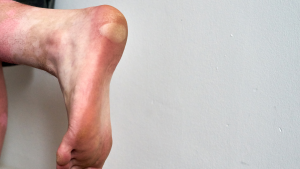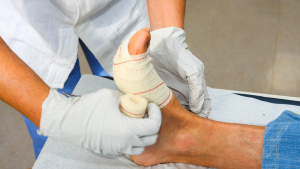Table of Contents
Diabetic Foot and Ankle Wound Care in Loganville
Diabetic foot and ankle wounds pose a serious risk for individuals with diabetes, often healing slowly and leading to severe complications without specialized care. However, with expert treatment, patients can effectively manage these complex wounds. A skilled wound care specialist in Loganville provides targeted diabetic wound care for the foot and ankle, helping prevent infections and promoting faster healing. At Loganville’s wound clinic, advanced techniques and personalized treatment ensure patients recover properly, minimizing future complications and improving quality of life.
What Is Wound Care?
Wound care focuses on treating and managing wounds that heal slowly or are prone to infection, such as diabetic foot ulcers. Specialists use various techniques to clean, dress, and monitor wounds to ensure proper healing and prevent serious complications. For individuals with diabetes, wound care of the foot and ankle is critical. Poor circulation and nerve damage make even minor injuries more likely to develop into serious health problems if not treated promptly.
A wound care specialist carefully evaluates the wound’s type, location, and severity to create a personalized treatment plan. For foot or ankle wounds, this plan may include debridement, specialized dressings, and advanced therapies. Fast, effective care helps prevent infections, reduces pain, and lowers the risk of severe complications such as amputation.
Understanding Diabetic Foot and Ankle Wound Care
Diabetes can delay wound healing due to circulation issues and nerve damage (neuropathy) . This makes diabetic wound care for the foot and ankle essential, focusing on infection prevention and faster healing. Without proper care, even a small cut or blister can develop into a serious ulcer.
. This makes diabetic wound care for the foot and ankle essential, focusing on infection prevention and faster healing. Without proper care, even a small cut or blister can develop into a serious ulcer.
A diabetic wound care specialist plays a key role in managing these wounds. They apply advanced treatments such as debridement, specialized dressings, or oxygen therapy to help the wound heal. The goal is to promote recovery, prevent infection, and avoid complications that could lead to amputation.
Certified Wound Care Specialist in Loganville
When dealing with foot or ankle wounds related to diabetes, seeking care from a certified wound care specialist is essential. In Loganville, patients have access to experienced specialists trained to address the challenges of diabetic wound healing. These certified specialists possess advanced knowledge in foot and ankle wound care and utilize the latest techniques to promote healing and prevent infections.
At the Loganville wound clinic, the specialist uses a comprehensive approach to treatment. This includes assessing wound severity, selecting the appropriate dressings, and employing advanced therapies such as debridement or infection control measures. The specialist works with other healthcare professionals to ensure each diabetic patient receives personalized care tailored to their specific needs.
Choosing a certified diabetic wound care specialist ensures the highest quality of care for foot and ankle wounds, reducing the risk of infections and complications.
Diabetic Foot and Ankle Wound Care Treatment Options
 Managing diabetic wounds of the foot and ankle therefore requires targeted care to promote healing and prevent complications. To help patients recover effectively, below are some of the most effective treatment options available at a wound care clinic:
Managing diabetic wounds of the foot and ankle therefore requires targeted care to promote healing and prevent complications. To help patients recover effectively, below are some of the most effective treatment options available at a wound care clinic:
- Debridement
Removing dead or infected tissue from the wound encourages healthy tissue growth and lowers the risk of infection. This essential step promotes faster healing, especially for diabetic foot wounds. - Advanced Wound Dressings
Specialized dressings create a moist environment crucial for healing. Hydrogels, foam dressings, and alginates are used based on the wound type and location, ensuring optimal recovery for foot or ankle ulcers. - Hyperbaric Oxygen Therapy (HBOT)
HBOT delivers oxygen in a pressurized environment to increase oxygen levels in the wound. This accelerates healing and reduces infection risk, particularly for deep or slow-healing wounds. - Infection Control and Antibiotics
Infection management is critical for diabetic wounds. Specialists may use topical antibiotics or antimicrobials to prevent and control infections, ensuring wounds remain clean and heal properly. - Offloading with Specialized Footwear
Reducing pressure on the wound is essential for foot ulcers. Custom orthotics, specialized footwear, or offloading devices such as casts or braces relieve pressure and promote healing. - Blood Sugar Management
Maintaining stable blood sugar levels plays a critical role in diabetic wound care. Elevated glucose levels slow down healing and increase the risk of infection. Specialists collaborate with patients to develop strategies for better glucose control, enhancing recovery.
These treatments work together to ensure proper healing and reduce the risk of severe complications.
The Importance of Early Intervention for Foot and Ankle Wounds
 Early intervention is essential when managing diabetic foot and ankle wounds. It improves recovery outcomes and prevents complications. Diabetes impairs the body’s natural healing abilities, making even minor wounds prone to infection and serious issues.
Early intervention is essential when managing diabetic foot and ankle wounds. It improves recovery outcomes and prevents complications. Diabetes impairs the body’s natural healing abilities, making even minor wounds prone to infection and serious issues.
Key Benefits of Early Wound Care:
- Prevents Infections and Complications
Timely treatment keeps wounds clean and prevents infections from spreading, reducing the risk of dangerous conditions like sepsis. - Reduces the Risk of Amputation
Diabetic foot ulcers are a leading cause of amputation. Early intervention allows specialists to control the wound and prevent tissue damage, avoiding the need for surgical intervention. - Speeds Up Healing
Treatments such as debridement and advanced dressings promote faster healing, preventing wounds from becoming chronic. - Prevents Chronic Wounds
Untreated wounds may linger and become chronic, requiring more intensive care. Seeking care early avoids long-term complications. - Promotes Long-Term Prevention
Specialists can identify underlying causes such as poor circulation or ill-fitting footwear and recommend solutions like custom orthotics to prevent future wounds.
Conclusion
When it comes to diabetic foot and ankle wound care, early intervention and expert treatment make all the difference in preventing complications. At Loganville’s Ankle & Foot Centers of America, specialists provide comprehensive care to help patients heal faster, manage chronic wounds, and avoid severe outcomes such as infections or amputations. Their patient-centered approach ensures that every individual receives the care they need to restore foot health and improve overall well-being.







